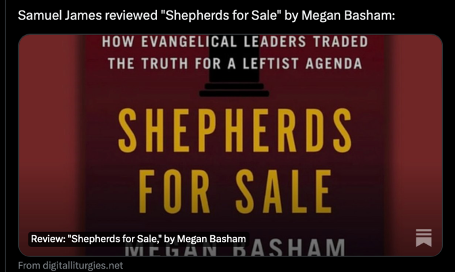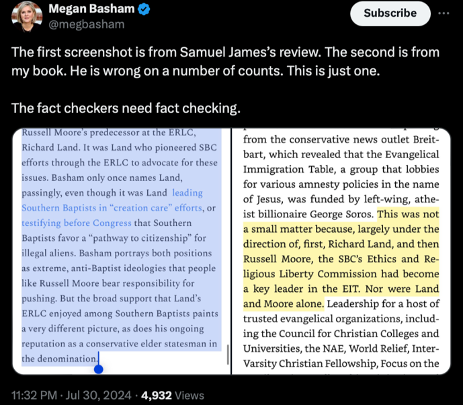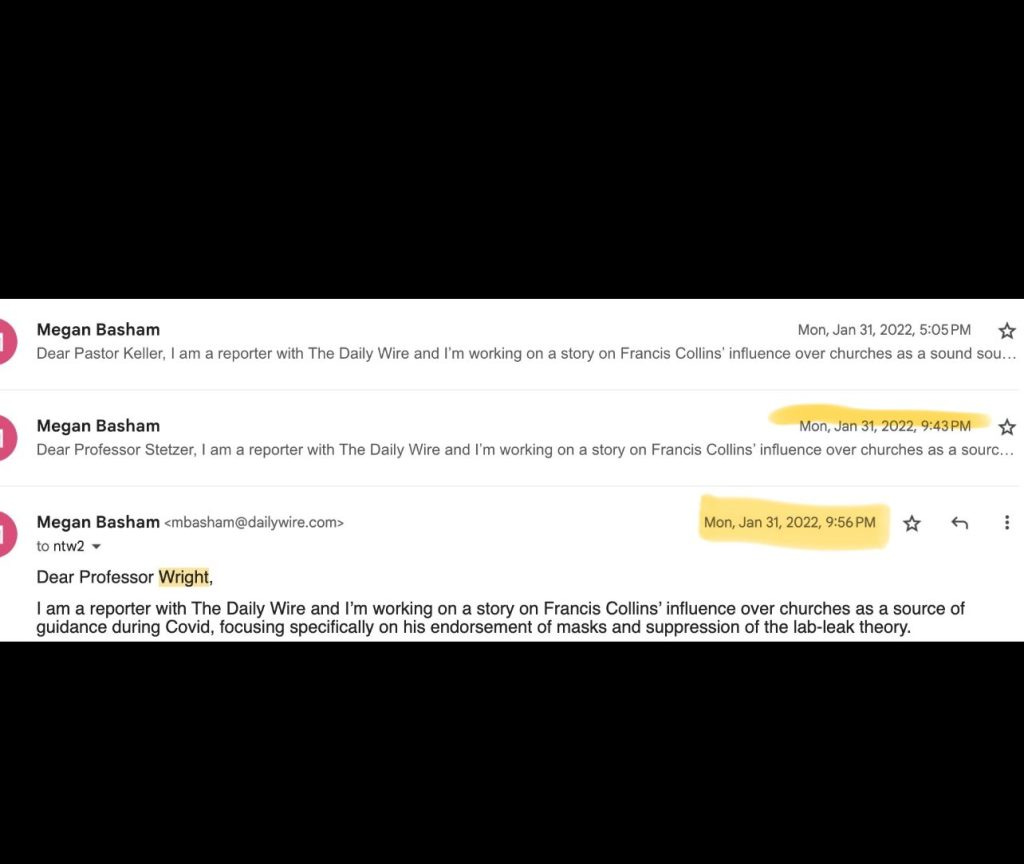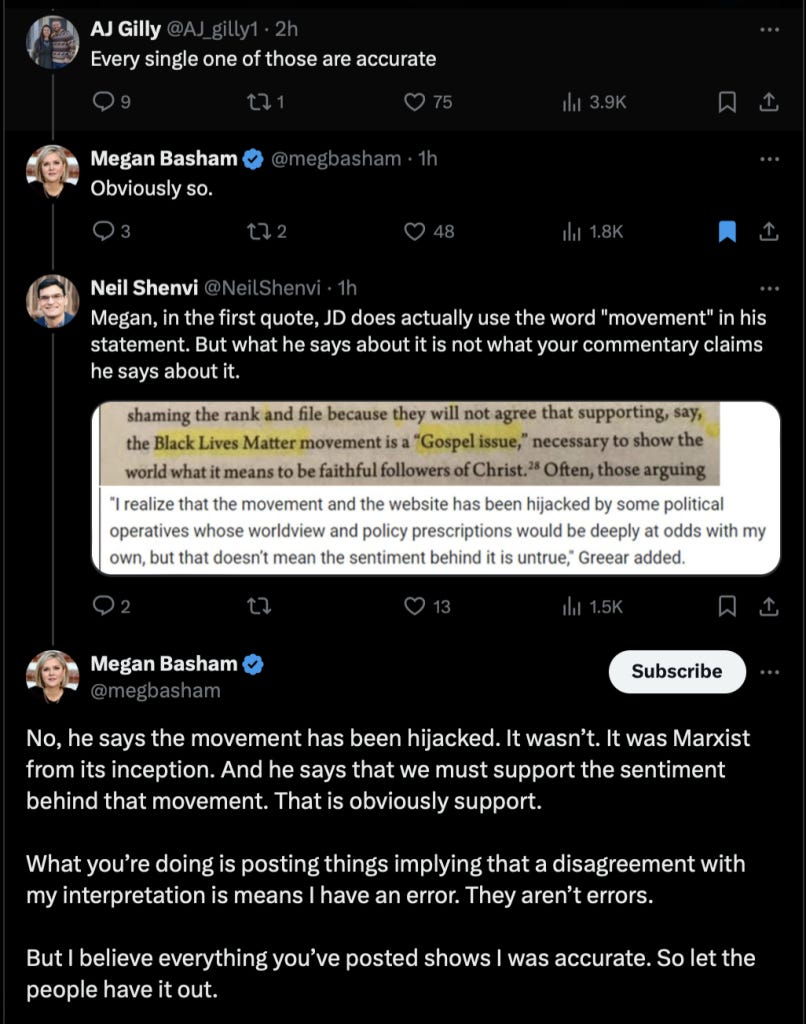
The reception Megan Basham’s book Shepherds for Sale earlier this week led to intense disagreement online. In this short article, I chronicle the timeline around these responses and link to key articles and videos.
This article will be updated semi-regularly as events transpire. So feel free to bookmark this link and check back from time-to-time.
July 30: The First Review
The first review I saw of the book came from Samuel James, a review I shared on the evening of July 30th. As of August 3, my tweet has gained over 100,000 impressions.
Since James critically reviewed Basham’s book, Basham herself responded to some of his claims on X. From her point of view, James misrepresented parts of her argument.
Wesley Hill on July 30th also questioned Basham’s ability to fact-find because she misidentified the seminary he went to:
On August 1st, Doug Wilson recommended Basham’s book.
One might have guessed the disagreements would slowly fizzle away as reviews came out for Basham’s book. After all, most books receive critical reviews, and usually in the course of things, an author will reply to those criticisms either by admitting fault or defending her claims.
But that did not happen.
August 2: Gavin Ortlund
On August 2nd Gavin Ortlund released a critical review—or more accurately a pushback against Basham’s characterization of Ortlund. Ortlund avers that Basham misrepresented him when it comes to climate change.
Many online responses to this video did not follow traditional lines of argument in which one proves and disproves a conclusion based on evidence. Instead, passionate replies inveighed against one person or another.
Yet some reasoned exchanges also occurred. For example, Basham herself disagreed with Ortlund on X. She maintains her criticism of Ortlund’s view of climate change.
Probably the simplest way to see Basham’s point of view written out is her response to Neil Shenvi on X.
Shenvi for his part was unpersuaded by Basham.
Whether Ortlund aimed to expose uncritical thinking or promote a political position seems to define this aspect of the debate.
Ortlund evidently felt misrepresented, and so he recorded a second video to clarify his view of climate change.
According to Ortlund, he wants people “to think more” about climate change. He does not see himself of as a political activist. For Ortlund, one can disagree over climate change, and that is okay. By contrast, Ortlund believes that the first chapter of her book on climate change leads off her argument against pastors trading the truth for money.
August 3: The Dispatch Review
A number of articles came out to comment or weigh in upon the debate (see here and here). See also this interview at Daily Wire and on Eric Metaxas’s show. And also note Jesse Johnson’s positive review at The Cripplegate. Lastly, Ben Marsh has created an X thread where he lists what he perceives as “lies” in Basham’s book.
But probably the next advance in the debate about this book centres on Warren Cole Smith’s critical review of Basham’s work at The Dispatch.
Given Smith’s ministry at MinistryWatch, he too shares Basham’s concern about how money corrupts large organizations. That said, the major criticism of Smith can be summed up in this paragraph:
In order to arrive as close to the truth as possible, one of an opinion journalist’s most basic duties is to understand and convey the perspectives of people with whom he or she disagrees. Basham fails to do this in her book—and that leads her to get a whole host of basic facts wrong. It’s worth asking: If we can’t trust her with the basic facts, why should we trust her with the interpretation of these facts?
Basham then responded to some of concerns that Smith brought up in his article here.
Danny Slavich offered counter-evidence that Basham has in the past reached out to someone at 10pm for comment on an article that comes out 10am the next morning.
The implication here being that while Basham may claim to responsibly reach out to authors that she speaks about, the on-the-ground reality is that she does not attain to the high standards she herself claims to hold.
August 5: Neil Shenvi
On August 5th, Neil Shenvi created a list of endnote errors in Megan Basham’s book. He joins John Reasnor who had also created a similar list. One example of Shenvi’s shows that Basham found objectionable words in a speech of JD Greear and appears to have editorialized them into her argument in ways that do not match the source material’s intent.
If Shenvi and Reasnor’s claims bear out the truth, then Basham should explain her editorializing of such sources. Given the severe stakes of a work titled Shepherds for Sale, readers should expect vetted facts and sound arguments.
Kevin Twit, for example, wrote: “How many times does someone need to misquote and misrepresent before you begin to suspect the thesis may be forced? Turns out that for too many people I know, there is no limit to factual errors if the thesis fits your view of the world.”
That said, “The one who states his case first seems right, until the other comes and examines him” (Prof 18:17). For this reason, readers should eagerly and charitably anticipate responses from Basham that either vindicate her use of sources or result in a retraction. Truth must stand as paramount here.
While not comprehensive in her response, Basham denied Shenvi’s claims about her work on X.
Reflections
I haven’t yet read Shepherds for Sale. My entry into this debate came from sharing a book review by Samuel James. Given these recent discussions, I may read the book. But I have found myself less interested in the content of the book and more interested in the responses to the book.
At this moment, I don’t have the time to write out my full thoughts. I’d only note that the merits of book should be judged by the book itself. Yet much of the online discussions seem wrapped around perceived motivations and friend-enemy distinctions.
It would be better, I think, if Basham responded to the critical reviews by noting their evidence and either admitting fault or vindicating her argument. She has begun to do this on X, but I think a longer article would be appropriate.
With that said, the argument of the book that pastors have exchanged truth for a leftist agenda should be confronted (as noted in the subtitle).
If it is true, then it is a damning truth; if it is not, then it is a damning slander. And if, as these things usually reveal, the truth is somewhere in the middle, then that somewhere must be found.
August 12: JD Greear Responds
Since I plan to read Basham’s book eventually, I’ll leave my refections as they are above. For now, I would like to add that JD Greear gave an open response to Megan Basham. In essence, Greear complains that the book’s “eporting is neither careful nor charitable, and in many places, demonstrably untrue, as even the simplest of internet searches reveals.”
Greear explains that his purpose in writing is for his local church, The Summit Church. He wants them to be equipped to understand and respond to criticisms in the book about him. This is important because the article itself is long and detailed. So it’s unlikely to be read by those convinced of Basham’s counter-thesis.
Basham herself provided an equally long response on X to Greear, which one can read by clicking here. Basham also posted an article version of her response here.
August 15: Neil Shenvi Reviews Basham’s Book
Neil Shenvi wrote a detailed review of Basham’s book, pointing to the factual errors therein. In summary, he writes, “Even if you wholeheartedly believe that #BigEva needs to be destroyed, you cannot turn a blind eye to factual errors in Basham’s book, especially since they pertain to the actual character of actual people.”
The post A Timeline of The Debates around Megan Basham’s Shepherds for Sale appeared first on Wyatt Graham.



















Do we have any information about her reacting with critiques face to face and not over X? Seems like a low blow (and an unchristian approach) to write a book suggesting these people are false teachers without getting their feedback up front, and then only responding to criticism via social media. Maybe I’m wrong, and I really hope I am, but this just seems petty.
Have you followed this discussion any more? Did you ever do a write up on the book?
I had someone give me a copy and wants me to read it. But the perceived factual errors and what appears to be misleading characterizations of people make me hesitant. I don’t want to devote the time to reading something that I’m going to question all of the contents. #aintnobodygottimeforthat